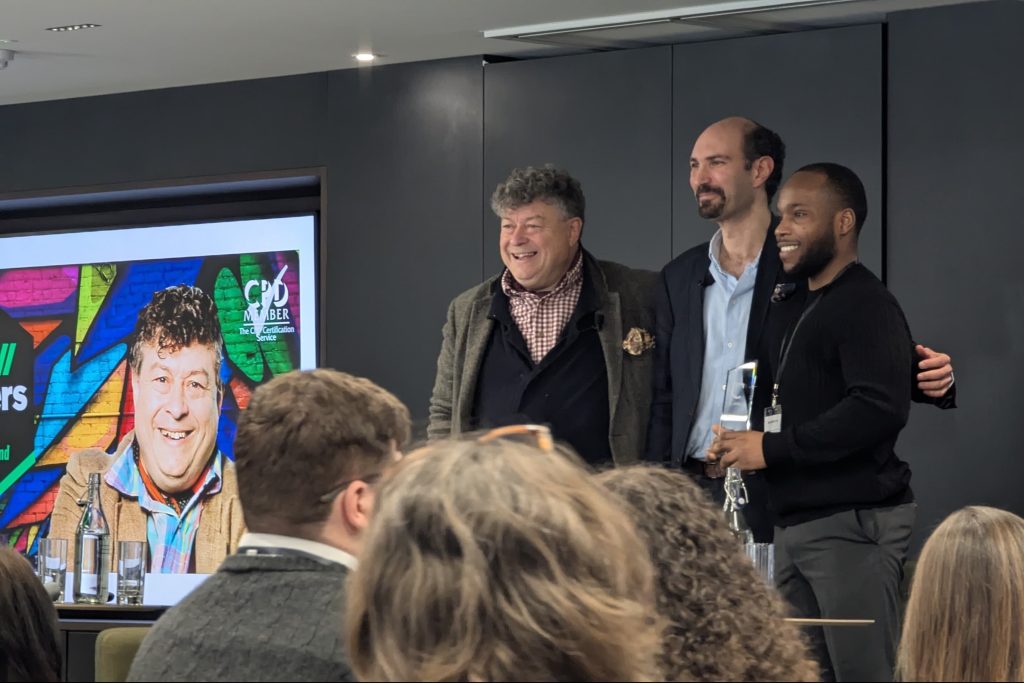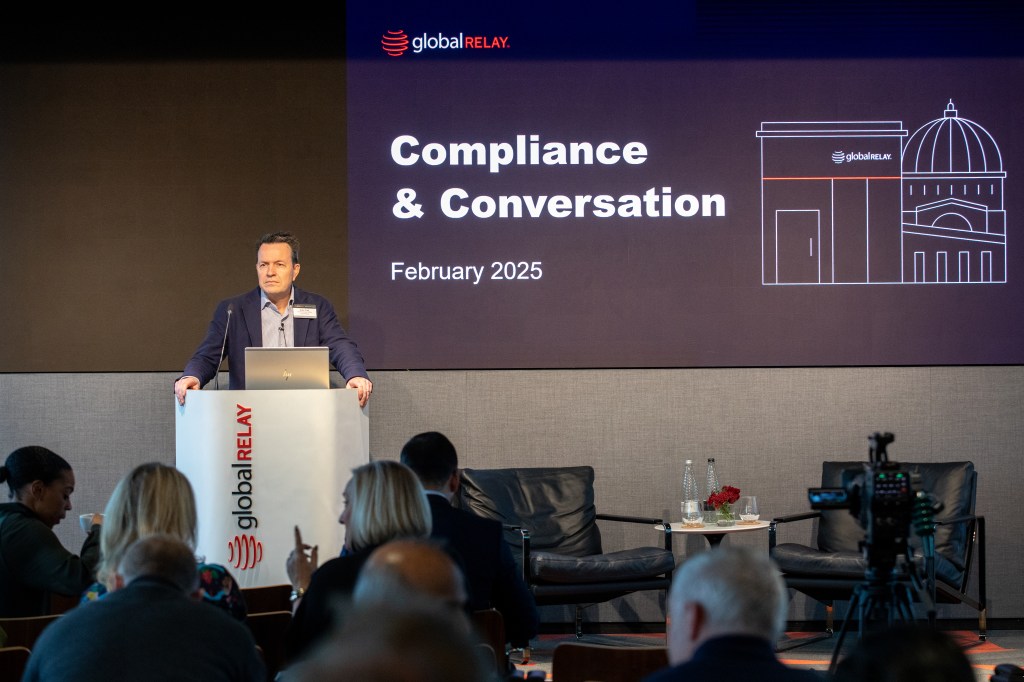Global Relay recently hosted a Compliance & Conversation event in London, bringing together leaders in the compliance field. The event focused on sharing knowledge and experiences, and building stronger connections within the compliance community.
Interview with Mark Taylor
In first session, Mark Taylor, a titan of compliance with experience at the Securities and Futures Authority (SFA), Hambros, Goldman Sachs, and Credit Suisse – where he was the MLRO and head of IB compliance and financial crime – discussed his career and thoughts on key compliance topics.
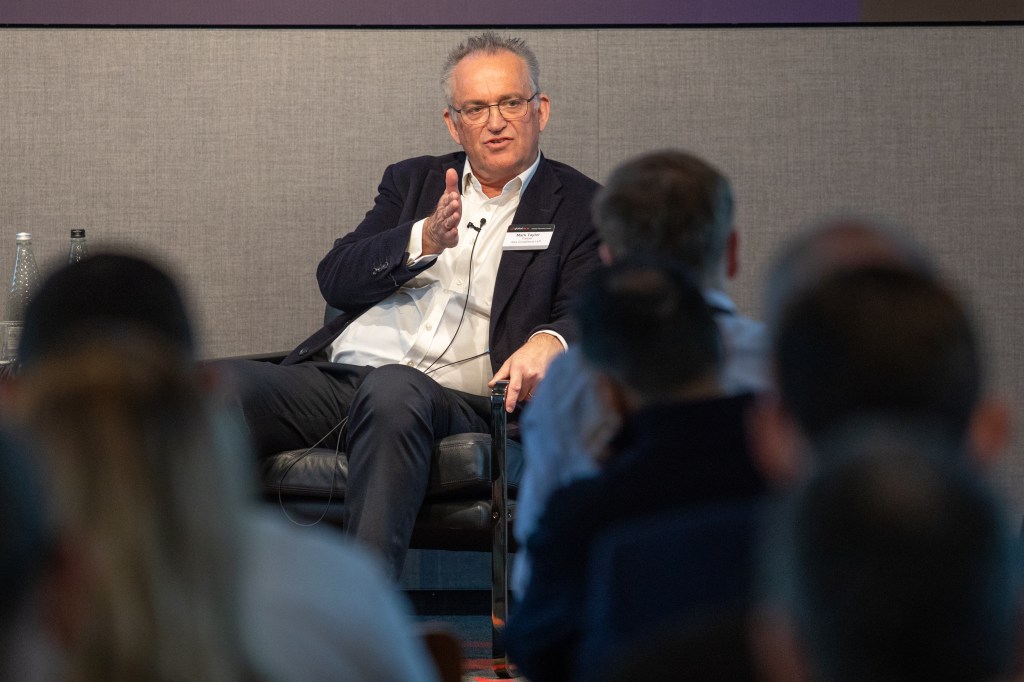
Early career and “old school” regulatory practices
Taylor discussed his early days at the SFA working on transaction monitoring, a relatively new concept at the time. He reflected on how this system, despite initial skepticism, became a standard practice and described the spirit as – “where people wanted to do the right thing.”
Taylor compared modern regulatory practices with those of the past, suggesting that while current regulation is more evidential, older methods had a directness and simplicity that could be beneficial. He highlighted examples of decisive regulatory interventions from previous years including an event which took place during the 1987 financial crisis – the head of surveillance rang a banking heavyweight and told him, “you will not default any brokers.” He didn’t and that crisis was therefore averted!
Politically exposed persons (PEPs)
Taylor expressed his frustration with the current spotlight on PEPs, arguing “we need to look at less rubbish, focus on the things that really matter.” He believes that financial crime compliance should focus on actual financial crime risk rather than suffering the compliance burden associated with targeting PEPs.
Culture in financial institutions
The discussion shifted to company culture, drawing parallels with a recent speech by the FCA’s COO Emily Sheppard. Taylor stressed the importance of open communication and accessibility to management. He warned against aggressive behavior that stifles dialogue and makes employees afraid to raise concerns, arguing that such environments can lead to unchecked misconduct. He also commented on the challenges new employees face in questioning established practices, particularly in profitable areas of the business.
Non-financial misconduct
Taylor discussed the rise of non-financial misconduct cases, like bullying and harassment, and stressed the need for firms to identify and root out such behavior. He reiterated that aggression, while sometimes associated with success, can easily cross the line into bullying. He emphasized the crucial role of management in creating a comfortable environment where employees feel safe to challenge, discuss issues, and raise grievances. He acknowledged the potential for false accusations but insisted that this shouldn’t detract from the importance of fostering a healthy work environment.
Whistleblowing
Taylor shared his views on whistleblowing, contrasting the US system with the UK’s. He argued that internal reporting mechanisms should be sufficient and effective, reducing the need for whistleblowing. He highlighted the potential negative consequences for whistleblowers in the UK and stressed the need for firms to create a culture where concerns can be raised safely without fear of reprisal, “people perform better when they feel safe.”
Senior Managers Regime (SMCR)
Taylor believes the SMCR has been successful in making senior managers more accountable and thoughtful about their roles. However, he also feels it has created a disproportionate burden, especially for roles such as the MLRO and compliance, considering the pay disparity between compliance and other roles in financial services.
Deregulation and growth
The interview concluded with a discussion about the government’s push for deregulation to encourage economic growth. Taylor agreed with the need to remove unnecessary and ineffective rules but cautioned against sacrificing regulatory oversight for the sake of growth. He believes there’s a middle ground and that simplifying regulations in less critical areas, like PEPs, can be beneficial: “Cut regulation with a lens on risk.”
Interviewer: Alex Viall, Chief Strategy Officer, Global Relay
See Mark’s profile on GRIP.
Recordkeeping and surveillance trends
A panel discussion on regulatory compliance surveillance trends, featuring:
- Anna Gooch, manager, Market Conduct team, Abrdn Asset Management
- Ugne Willard, global head of Communications Surveillance, Barclays
- Hannah Bowery, senior manager, Surveillance and Market Abuse SME, PwC
- Jennie Clarke, head of content, Global Relay
The conversation revolved around the evolving landscape of regulatory oversight, the increasing role of technology, and the challenges firms face in maintaining compliance.
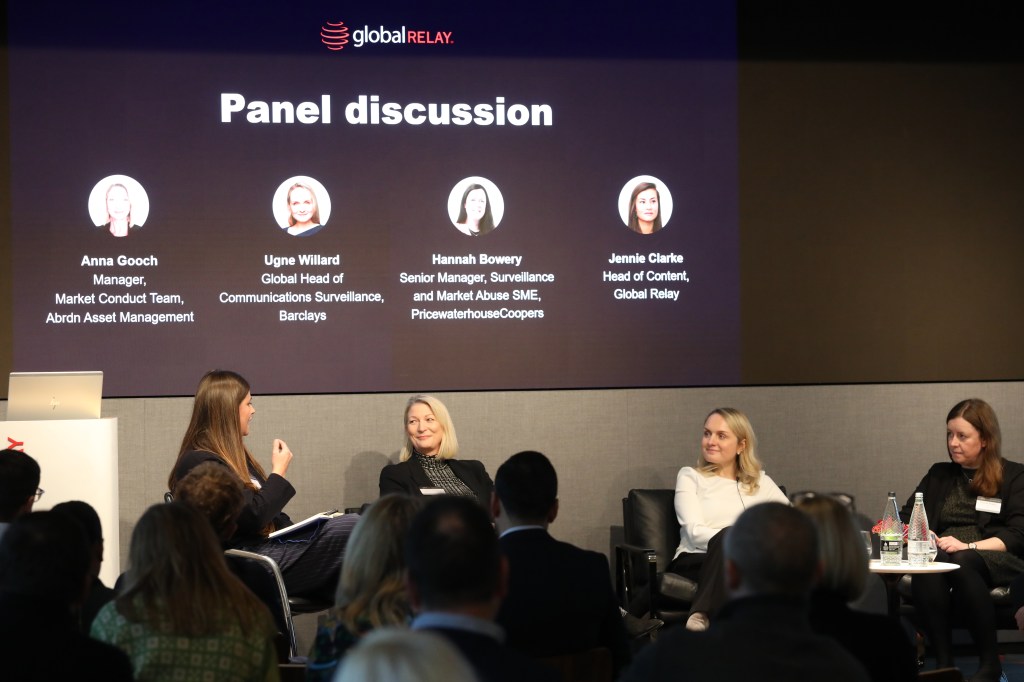
FCA’s performance
The discussion began with a critical look at the FCA’s performance following the APPG report, enforcement name and shame industry backlash and accusations of poor management. Gooch, a former FCA regulator, acknowledged there has been criticism of “dishonesty and incompetence” but during her 13-year tenure it was not something she had experienced. She also stressed the dedication of many within the FCA and suggested some criticisms are overstated, describing the APPG report on the FCA as like “asking 10,000 Spurs fans ‘What do you think of Arsenal?’.”
The panel discussed the FCA’s shift towards promoting competition and growth, questioning whether this new objective creates further strain on an already over-burdened regulator. The FCA’s increased transparency and direct messaging, particularly regarding AI, were noted as positive developments.
Artificial intelligence (AI) taking center stage
The panel discussed the rapid adoption of AI in surveillance, citing the Global Relay (GR) survey indicating 75% of firms are already using it. However, a significant concern is the lack of explainability, with many firms unable to understand how their AI models function. This “black box” problem raises questions about regulatory acceptance and the ability to justify decisions made by AI. The panelists discussed the importance of independent testing and assessment of AI models, including lexicon versus LLM comparisons. Model risk management and the need for continuous validation in the face of evolving data and market conditions were also highlighted.
The discussion touched upon the longevity of AI and the possibility of AI being used to perform model risk assessment, in order to ensure models remain relevant and effective.
Non-financial misconduct
The panelists agreed that this is not a new issue, but the FCA’s renewed emphasis is requiring firms to take it more seriously. They discussed the interconnectedness of different types of misconduct, noting that market abuse cases often involve other conduct issues. Gooch said: “It was rare that you would see a market abuse case that didn’t have evidence of other types of misconducts.”
They also addressed the importance of utilizing all available data, including HR information, to identify and address non-financial misconduct. There is also the challenge of integrating conduct considerations into fitness and proprietary assessments.
Social media
The conversation shifted to social media surveillance. The panel acknowledged the increasing use of social media platforms for communication and the associated risks. Data from the GR survey indicated a rise in capturing various social media platforms, including personal Instagram accounts. However, the panelists also expressed concerns about data privacy and the legality of surveilling personal accounts. But it was clear that if firms allow social media for business uses then it must be captured.
The discussion highlighted the need for clear policies regarding social media use and the importance of collaboration between different teams to identify and mitigate risks. The challenges of proactively identifying and addressing social media-related misconduct were explored, including the difficulty of monitoring communications on personal devices.
Future focus
Looking ahead, the panelists discussed the use of AI in asset management and client onboarding, data governance, and vendor evaluations. However, the increasing sophistication of AI offerings, including those using LLMs, necessitates careful due diligence and a thorough understanding of the underlying technology.
In the Q&A, one observer compared knowledge of how AI works with algo trading. “It’s accepted that we don’t quite know how the algos work, but we do know that they’re working or more importantly, we do know if they’re not producing results and I found that quite analogous, to be honest.”
The panel concluded with a comment on the importance of the human element in AI decision-making, stressing the need for model validation infrastructure and human oversight to ensure AI models are used effectively and ethically.
A resilient mind
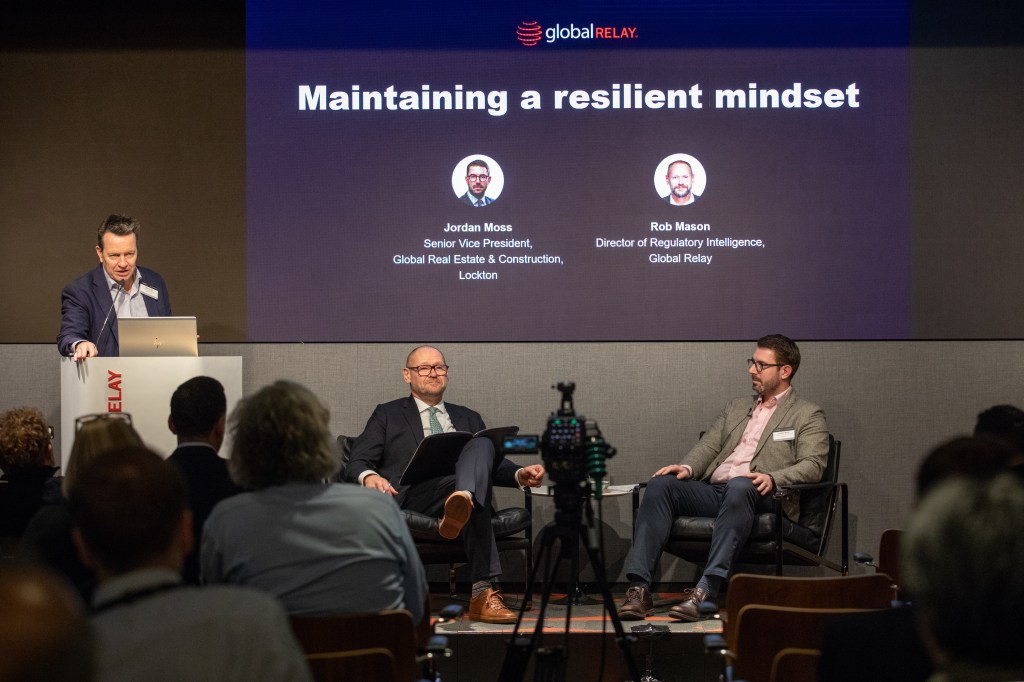
The final comment came from Jordan Moss, senior vice president, Global Real Estate & Construction, Lockton, who both enthralled and inspired the compliance crowd with his personal story of how a resilient mindset and strong focus on moving forward has given him the strength to overcome some fairly significant health challenges: “Find out who you are, set no limits… I’ve chased the hard stuff, overcoming challenge and yes I’ve been through some very extreme things, I think that sense of fulfilment far outweighs the drug of fun.”










